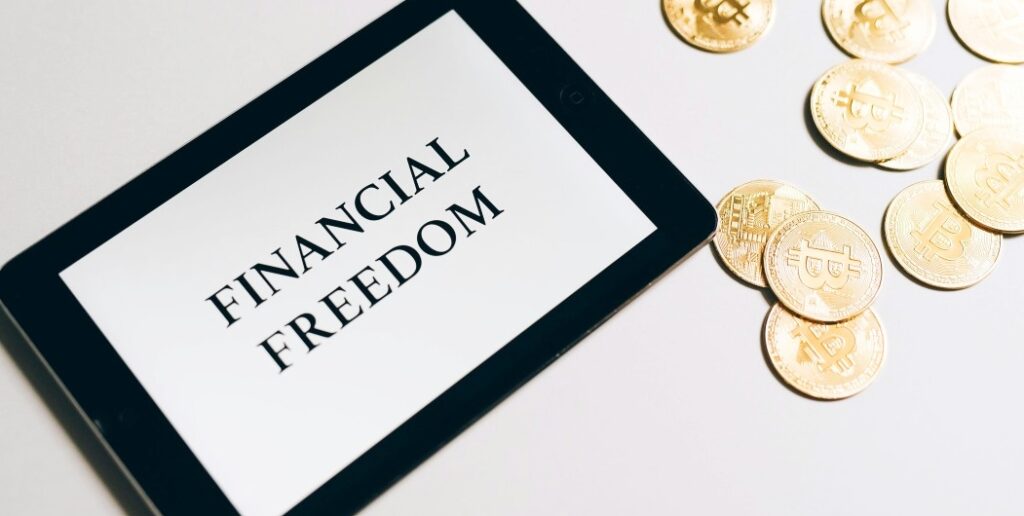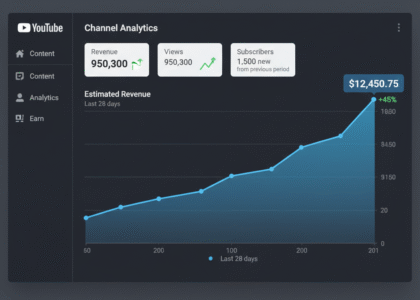Imagine waking up every day knowing you have the financial freedom to choose how you spend your time. No more living paycheck to paycheck or feeling trapped in a job just to cover expenses. This is the essence of financial independence—the ability to support yourself without relying on a 9-to-5 job.
In today’s economy, achieving financial independence may seem difficult, but with the right strategies, it is possible. Whether you are a young professional, a freelancer, or someone planning for early retirement, this guide will help you take control of your finances and work towards lasting wealth and freedom.
What is Financial Independence?

Financial independence means having enough income—whether from investments, savings, or passive income streams—to cover your living expenses without needing a full-time job. It allows you to make life decisions based on what you want, rather than financial necessity.
Why is Financial Independence Important?
- Freedom of Choice – Work because you want to, not because you have to.
- Reduced Stress – Financial security brings peace of mind.
- Early Retirement – Reach a stage where work is optional.
- More Time for Passions – Spend time with family, travel, or pursue hobbies.
Steps to Achieve Financial Independence
1. Set Clear Financial Goals
To reach financial independence, define your goals clearly. Ask yourself:
- What is my target savings amount?
- When do I want to achieve financial independence?
- How much do I need to cover my expenses without a full-time job?
Actionable Tip: Use the 4% rule, which suggests that you need about 25 times your annual expenses saved in investments to be financially independent.
2. Create a Budget and Stick to It
Tracking your income and expenses is crucial for financial success. A budget helps you save more, spend wisely, and avoid unnecessary debt.
How to Budget for Financial Independence
- Track Every Expense – Use apps like Mint or YNAB to monitor spending.
- Reduce Unnecessary Costs – Cut out impulse purchases and subscriptions you do not use.
- Allocate Savings – Set aside a fixed percentage of your income for investments.
Example: If you earn $5,000 per month, consider saving at least 30% toward your financial independence goal.
3. Increase Your Income Streams
Relying solely on one source of income can be risky. The fastest way to achieve financial independence is by diversifying income sources.
Ways to Increase Your Income:
- Invest in Stocks or Real Estate – Passive income from dividends or rental properties.
- Start a Side Business – Freelancing, blogging, or e-commerce can provide extra income.
- Create Digital Products – Online courses, eBooks, or software can generate passive income.
- Monetize Skills – Coaching, consulting, or tutoring can bring additional earnings.
Example: If your main job covers your basic expenses, invest your side income to accelerate financial independence.
4. Save and Invest Wisely
Saving is important, but investing is what truly builds wealth. Keeping money in a savings account alone won’t lead to financial independence, as inflation erodes its value over time.
Best Investment Options for Financial Independence:
- Stock Market – Invest in index funds, ETFs, or dividend stocks.
- Real Estate – Rental properties or REITs provide passive income.
- Bonds and Mutual Funds – Low-risk investments for portfolio balance.
- Retirement Accounts – Max out 401(k), IRA, or Roth IRA for long-term growth.
Example: Investing just $500 per month in a stock index fund with a 7% return could grow to $1 million in 30 years.
5. Eliminate Debt Quickly

Debt can slow down your financial independence journey. The faster you pay off debt, the sooner you can invest and save more.
How to Get Rid of Debt Faster:
- Use the Debt Snowball Method – Pay off small debts first for motivation.
- Try the Debt Avalanche Method – Focus on high-interest debt first to save money.
- Avoid High-Interest Loans – Credit card debt can drain your income.
Example: Paying off a $5,000 credit card debt with a 20% interest rate could save you thousands in interest over time.
6. Cut Unnecessary Expenses
A frugal lifestyle does not mean giving up everything—it means spending wisely. Reducing unnecessary expenses helps you save and invest more.
Smart Ways to Cut Costs:
- Cook at Home – Reduce eating out and expensive coffee habits.
- Use Public Transport – Avoid car payments and fuel costs.
- Cancel Unused Subscriptions – Gym, streaming services, and memberships add up.
Example: Saving $200 per month on unnecessary expenses adds up to $2,400 per year—money that can be invested.
7. Build an Emergency Fund
Unexpected expenses can derail your financial plans. An emergency fund provides security and prevents you from dipping into investments.
How Much to Save in an Emergency Fund?
- 3-6 months of living expenses is recommended.
- Keep the fund in a high-yield savings account for easy access.
Example: If your monthly expenses are $2,000, aim to save $6,000–$12,000 in an emergency fund.
(FAQs)
1. What is the best way to achieve financial independence?
The best way is to increase income, reduce expenses, invest wisely, and eliminate debt as quickly as possible.
2. How much money do I need to be financially independent?
It depends on your lifestyle and expenses, but a common rule is to save 25 times your annual expenses to sustain long-term financial independence.
3. Can I achieve financial independence without investing?
It is difficult to reach financial independence without investing, as inflation decreases the value of savings over time. Investments allow your money to grow.
4. How long does it take to become financially independent?
It varies for everyone. With aggressive saving and investing, some achieve it in 10-15 years, while others may take longer depending on income and lifestyle.
5. Is financial independence the same as retirement?
Not necessarily. Financial independence means you can cover your expenses without working, but you may still choose to work for personal fulfillment.
Conclusion
Achieving financial independence is a step-by-step process that requires planning, discipline, and smart investing. By following these strategies, you can build wealth and enjoy a life of freedom.
Key Takeaways:
- Set clear financial goals and budget wisely.
- Increase income streams through side hustles and investments.
- Invest strategically in stocks, real estate, and retirement accounts.
- Eliminate debt quickly to free up cash for investments.
- Reduce unnecessary expenses and build an emergency fund.
Ready to take charge of your financial future? Start today and work towards financial independence! Visit GetCashVibe for more expert tips.






